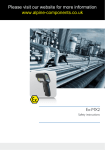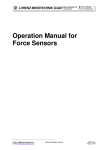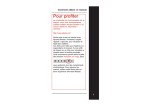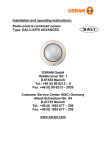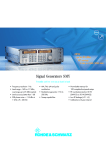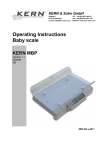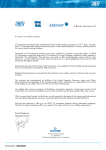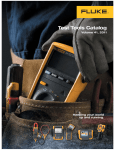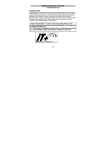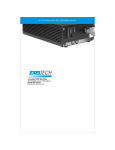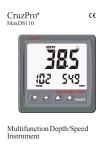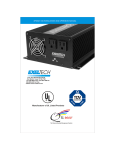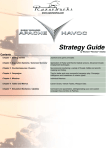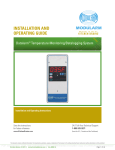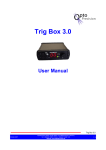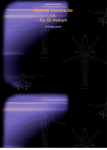Download 574 eng.indd
Transcript
574 Precision Infrared Thermometer Users Manual March 2005 © 2005 Fluke Corporation. All rights reserved. All product names are trademarks of their respective companies. 574 LIMITED WARRANTY AND LIMITATION OF LIABILITY This Fluke product will be free from defects in material and workmanship for one year from the date of purchase. This warranty does not cover fuses, disposable batteries, or damage from accident, neglect, misuse, alteration, contamination, or abnormal conditions of operation or handling. Resellers are not authorized to extend any other warranty on Fluke’s behalf. To obtain service during the warranty period, contact your nearest Fluke authorized service center to obtain return authorization information, then send the product to that Service Center with a description of the problem. THIS WARRANTY IS YOUR ONLY REMEDY. NO OTHER WARRANTIES, SUCH AS FITNESS FOR A PARTICULAR PURPOSE, ARE EXPRESSED OR IMPLIED. FLUKE IS NOT LIABLE FOR ANY SPECIAL, INDIRECT, INCIDENTAL OR CONSEQUENTIAL DAMAGES OR LOSSES, ARISING FROM ANY CAUSE OR THEORY. Since some states or countries do not allow the exclusion or limitation of an implied warranty or of incidental or consequential damages, this limitation of liability may not apply to you. 2 574 Safety Information Warning A Warning identifies conditions and actions that pose hazards to the user. To avoid electrical shock or personal injury, follow these guidelines: • • • • • • • • Do not point laser directly at eye or indirectly off reflective surfaces. Before using the thermometer inspect the case. Do not use the thermometer if it appears damaged. Look for cracks or missing plastic. Replace the batteries as soon as the battery indicator two or less segments. Do not use the thermometer if it operates abnormally. Protection may be impaired. When in doubt, have the thermometer serviced. Do not operate the thermometer around explosive gas, vapor, or dust. Do not connect the optional external probe to live electrical circuits. To avoid a burn hazard, remember that highly reflective objects will result in lower than actual temperature measurements. Do not use in a manner not specified by this manual or the protection supplied by the equipment may be impaired. Caution To avoid damaging the thermometer or the equipment under test protect them from the following: • EMF (electro-magnetic fields) from arc welders, induction heaters, etc. • Static electricity • Thermal shock (caused by large or abrupt ambient temperature changes- allow 30 minutes for thermometer to stabilize before use). • Do not leave the thermometer on or near objects of high temperature. 3 574 Table of Contents Introduction ........................................................... 5 Warning for the Model 574 NI ............................... 6 Symbols and Safety Markings .............................. 7 Laser Warning and Serial Number Labels ............. 8 Delivery Content .................................................... 9 Functions and Display ........................................... 10 Batteries and Measurement .................................. 11 Field of View .......................................................... 12 Spot Size ............................................................... 13 Emissivity - Explanation and Adjust ...................... 14 Emissivity - Table and Unknown Value .................. 15 Mode - Maximum and Minimum ........................... 16 Mode - Difference and Avarage ............................ 17 Probe Connections................................................ 18 Setup Alarm ........................................................... 19 Setup - Time and Date .......................................... 20 Setup - Offset and Min-Max Values ...................... 21 Data Logging and Recall ....................................... 22 Display ................................................................... 23 Display - Man. Range ............................................ 24 Display - Cycle ..................................................... 25 DIP Switches ......................................................... 26 Troubleshooting ..................................................... 27 Maintenance .......................................................... 28 Emissivity Table (Selected Values)......................... 29 CE Conformity ....................................................... 30 Specifications ........................................................ 31 Factory Defaults .................................................... 32 4 574 Introduction The Fluke Model 574 Infrared Thermometer (the thermometer) is for non-contact temperature measurement. This thermometer determines an object‘s surface temperature by measuring the amount of infrared energy radiated by the object‘s surface. Contacting Fluke To contact Fluke, call one of the following telephone numbers: USA: 1-888-44-FLUKE (1-888-443-5853) Canada: 1-800-36-FLUKE (1-800-363-5853) Europe: +31 402-675-200 Japan: +81-3-3434-0181 Singapore: +65-738-5655 Anywhere in the world: +1-425-446-5500 For USA Service: 1-888-99-FLUKE (1-888-993-5853) Or, visit Fluke's Web site at www.fluke.com. To register your product, visit register.fluke.com. 5 574 Warning for the Model 574 NI Concerning Factory Mutual Approved Nonincendive Devices: Operation in Environments that Require Nonincendive Devices WARNING IN HAZARDOUS LOCATIONS DO NOT use serial port connections, change batteries or open serial port cover. To reduce risk of explosion in hazardous locations, use only Fluke temp probe part 2432508 and do not use other accessories, such as power supply and cables. A nonincendive rating (NI) indicates that this infrared thermometer has been tested to standards for preventing explosions in hazardous areas by limiting the ability of equipment to ignite a specified flammable gas or vapor-in-air mixture. Nonincendive equipment is incapable of releasing sufficient electrical or thermal energy to ignite flammable gases or vapors under NORMAL operation and environmental conditions. This noncontact thermometer has a Factory Mutual Nonincendive rating. The rating from this USA organization reads: “Nonincendive, Class I, Division 2, Groups A, B, C, D; Class I, Zone 2 IIC; T4 Ta = 50ºC when used with 1.5V alkaline batteries.“ A Class I, Division 2 location is a location: • where volatile flammable liquids or flammable gases or vapors exist, but are normally confined within closed containers; • where ignitable concentrations of gases, vapors or liquids are normally prevented by positive mechanical ventilation; or • adjacent to a Class I, Division 1 location, where ignitable concentrations might be occasionally communicated • groups A, B, C, D refers to: Acetylene, Hydrogen, Ethylene, and Propane. 6 574 Symbols and Safety Markings Symbol Explanation Risk of danger. Important information. See Manual. Hazardous voltage. Precedes warning Warning. Laser. Conforms to requirements of European Union and European Free Trade Association (EFTA) °C Celsius °F Fahrenheit Battery LASER The laser sight simplifies sighting of the measurement object. It shows the spot size that includes the measured target. To turn the laser on or off press the LASER button (K) when the trigger is pulled. A laser symbol (1) appears when the laser is on. The laser automatically turns off if you release the trigger. K 1 1 7 574 Laser Warning and Serial Number Labels 8 574 Delivery Content • • • • • • • • The unit Getting Started Two AA batteries Manual on CD Thermocouple type K probe Windows-based software on CD RS232 cable Power supply 9 574 Functions and Display FUNCTIONS USER INTERFACE Function keys and display: (A) Visual and audible alarm (B) Display (C) Up and Down keys (D) Enter (E) Handle and battery compartment (DIP switches for adjustments are inside handle) (F) Trigger (G) Tripod mount (H) 6 main function keys A B H C G F D E DISPLAY Displayed functions: (1) Laser condition / Lock symbol (2) Time (or date) (3) Main temperature display (4) Graphic display (5) Emissivity value (6) Status bar (7) Mode indicator (8) Battery life indicator (9) MAX, MIN, DIF, AVG symbols 10 1 2 9 3 8 7 4 5 6 574 Batteries and Measurement To open the battery compartment, press gently on the top part of the handle to release the catch and pivot the grip as shown in the figure. Orient the batteries (two alkaline R6 (AA, UM3)) positive side up as shown on the housing. MEASUREMENT MEASUREMENT QUICK START To take a temperature measurement, hold the unit as shown. Aim at the target. Pull the trigger (F). The temperature of the object being measured is shown on the display (B). The temperature will be displayed for seven seconds after trigger is released. 11 574 Field of View Make sure that the target is larger than the unit’s spot size. The smaller the target, the closer you should be to it. 12 574 Spot Size STANDARD MODEL Optical Chart 19.8 SPOT DIA. (mm) 24 23 24 29.0 44.0 2000 1500 1000 500 0 100 250 19 mm @ 1150 mm 2.3 58.0 2.5 2.9 72.0 3000 0.9 0.87 0.81 0.82 1.85 1.51 2500 1.0 1.2 120 0.76 IN @ 46 IN 108 100 84 60 72 46 48 30 36 0 20 SPOT DIA. (IN) DISTANCE: SENSOR TO OBJECT (IN) DISTANCE: SENSOR TO OBJECT (mm) FOCUS POINT D:S = 60:1 FAR FIELD D:S = 35:1 CLOSE FOCUS MODEL Optical Chart SPOT DIA. (IN) DISTANCE: SENSOR TO OBJECT (IN) 0 2 4 6 7.9 9.8 20 0.24 IN @ 11.8 IN 1 0.9 0.75 0.62 0.49 0.37 40 2.81 0.93 SPOT DIA. (mm) Close Focus 15,5 12,3 9,2 25 22 18,7 23 70 6 mm @ 300 mm 0 50 100 150 200 250 500 1000 DISTANCE: SENSOR TO OBJECT (mm) FOCUS POINT D:S = 50:1 FAR FIELD D:S = 12:1 The measured spot size depends on the distance between the object you are measuring and the infrared thermometer. The relationship between distance and spot size is 60:1(Standard Focus) or 50:1 (Close Focus) at the focus point. The D:S in the far field (>33ft/ 10m) is 35:1 (Standard) or 12:1 (Close Focus). 13 574 Emissivity - Explanation and Adjust The amount of infrared energy radiated by an object depends on its emissivity and its temperature. The emissivity depends on the material and its surface characteristics. For more accurate readings, adjust the emissivity value for the type of material being measured. Reflected energy Emitted energy Transmitted energy EMISSIVITY Target EMISSIVITY ADJUST EMISSIVITY To adjust the emissivity value, press EMISS (P). Use the Up and Down keys to select “Free“ (“Free” will have a (“Free flashing underline) (7). Press EMISS again. “Free” is not underlined, and the emissivity icon (5) flashes. Use the Up and Down keys (C) to adjust. Press ENTER (D) to activate this setting. 14 5 C P 7 D 574 Emissivity - Table and Unknown Value TABLE OF VALUES T To choose the emissivity of a material, press EMISS (P). The display shows a material name (7), an emissivity value, and the calculated temperature value (5). To choose another material, use the Up and Down keys (C). Press ENTER (D) to activate this setting. 5 C P 7 D UNKNOWN VALUE T adjust the unit’s To emissivity value for a material with unknown emissivity, plug in the probe. Pull the unit’s trigger. Place the measuring tip of the probe on the area to be measured. Wait for the reading to stabilize. Note the indicated probe temperature reading. Release the trigger. Pull the trigger again. Measure the same area using infrared measurement. Press the emissivity button (P). Use the Up and Down keys (C) to select the material name “Free” which will be shown in the display (7). Press the emissivity button (P) again until the emissivity sign (5) flashes. Use the arrow keys (C) to change the emissivity value until the temperature matches the probe’s reading. 15 574 Mode - Maximum and Minimum MAXIMUM To activate the MAX mode, press MODE (O) until the MAX symbol appears (9). The measured maximum temperature is displayed (3) as long as the trigger is pulled or locked on. The real time temperature is shown in the lower part of the display (NORM) (7). MAX 9 3 O 7 MODE MINIMUM To activate the MIN mode, press MODE (O) until the MIN symbol (9) appears. The measured minimum temperature (3) is displayed as long as the trigger is pulled or locked on. The real time temperature is shown in the lower part of the display (NORM) (7). 16 MIN 9 3 O 7 574 Mode - Difference and Avarage DIFFERENCE To activate the DIF mode, press MODE (O) until the DIF symbol (9) appears. The difference between the measured max and min temperatures is displayed (3) as long as the trigger is pulled or locked on. The real time temperature is shown in the lower part of the display (NORM) (7). DIF 9 3 O 7 AVERAGE To activate the AVG mode, press MODE (O) until the AVG symbol (9) appears. The average value of measured temperatures (3) is displayed as long as the trigger is pulled or locked on. The real time temperature is shown in the lower part of the display (NORM) (7). AVG 9 3 O 7 17 574 Probe Connections PROBE CONNECTIONS Open the battery compartment and set the switches ON or Off according to the desired probe type. (10) NTC - thermistor (11) TC - thermocouple (12) Thermocouple type J (13) Thermocouple type K 11 13 10 12 Connect the probe to the input (U). Press MODE, until the desired probe symbol (7) appears. The probe temperature is shown in the lower part of the display (6). The real time infrared temperature is shown in the main display (3). 18 3 U 7 6 574 Setup Alarm HIGH ALARM The high alarm (HiAl) generates an audible and visual (flashing LED (A) and laser) alarm if the temperature is above the setpoint. To set the alarm value (6), Press SETUP (N) once, and use the Up and Down keys (C). Then press ENTER (D) to activate this setpoint. A 6 C N D LOW ALARM The low alarm (LoAl) generates an audible and visual (flashing LED (A) and laser) alarm if the temperature is below the setpoint. To set the alarm value (6), Press SETUP (N) twice and use the Up and Down keys (C). Then press ENTER (D) to activate this setpoint. A C N 6 D 19 574 Setup - Time and Date TIME To set the time, press SETUP (N) three times. Change the time (2) using the Up and Down keys (C). Then press ENTER (D) for each time segment to activate this time setting. The time appears on the display and is stored within the data logger. 2 C N D DATE To set the date, press SETUP (N) four times. Change the date using the Up and Down keys (C). Then press ENTER (D) for each date segment to activate this date setting. The date (2) is stored within the data logger. 20 2 C N D 574 Setup - Offset and Min-Max Values OFFSET This function is used with a selected emissivity to add or subtract an offset value (±10°C/±18°F) to the temperature value. Press C the Setup button (N) until "Offset" appears in the N display. With the arrow D keys (C) adjust the display to the corrected value. Press ENTER (D) to confirm. The OFFSET feature allows the temperature values for several units to be matched, correcting for the allowed temperature tolerance difference between units. The OFFSET function can also be used to increase the accuracy for a narrow temperature range. MODE MIN-MAX V VALUES T show the minimum To and maximum temperature values during a measurement at the bottom of the display, press MODE (O) until the two values appear (6). 6 O MODE MAX MIN DIF AVG TC/NTC MIN-MAX 21 574 Data Logging and Recall HOW TO STORE DATA By pressing the ENTER button (D) the LOG function (6) appears on the display. Pull the trigger (F) and hold it. Aim at the target. Be sure that the laser sighting is inside the target. Gently release the trigger to record the temperature. The next location will be shown on the display. This function is also initiated by pressing the DATA button (M) once. 6 M D F DATA DAT TA RECALL T Recall stored data, To press the ENTER button (D), without pulling the trigger. Then press the DATA button (M) until RCL appears on the display. A log location will be shown (6). To select another log location, use the Up and Down keys (C). 22 C M 6 D 574 Display GRAPHIC DISPLAY The graphic display (4) shows the temperature as a picture. The last ten measurements are shown (B). It is possible to choose between Auto Range and Manual Range. In manual range the user defines the beginning and ending temperature points of the graph. 4 B AUTO OR MAN RANGE Press DISPLA DISPLAY (L) once. Use the Up and Down keys (C) to toggle between ranges. Auto Range is automatically defined by the measured maximum and minimum value. Manual Range (Man Range) is user defined (see DISPLA DISPLAY, BEGIN section). C L 23 574 Display - Man. Range DISPLAY BEGIN (Man. Range) To set the BEGIN value for the graphic display (Man Range is activated), press DISPLAY (L) until “Begin” is shown at the status bar. Use the Up and Down keys (C) to select the value (6). 6 L C DISPLAY END (Man. Range) To set the END value of the graphic display (Man. Range), press DISPLA DISPLAY (L) until ”End” is shown at the status bar. Use the Up and Down keys (C) to select the value (6). 24 6 L C 574 Display - Cycle CYCLE allows the adjustment of the display interval. Press DISPLAY (L) until Cycl.: (7) is shown at the status bar. To select the interval time, use the Up and Down keys (C). The default value is pre-set for 0.2 sec. 7 L C 25 574 DIP Switches Change the setting in the unit by using the DIP switches located in the battery compartment (see BATTERIES section). BA Factory Defaults� DIP-Switch Settings� Lock: Trigger locked (on) or unlocked (off). °C/°F:°C/°F: changes changes between between °C and °F and date and time format. Buzzer: Audible alarm On or Off. Backlight: Backlight On or Off. Set Default: Activates the factory defaults by overwriting listed settings (see specifications). Ltd. Access: No function buttons will work. Laserflash: The laser flashes in case of over- or underranging of the alarm values. Digi/Ana: Digital or Analog output. Time/Date: Time or date shown on the display. NTC/TC: Thermistor (NTC) or thermocouple (TC). TC-J/TC-K: Type of thermocouples. 26 ON Lock C/ F Buzzer Backlight Set Default Ltd. Access Laserflash Printer Digi/Ana Time/Date NTC/TC TC-J/TC-K 574 Troubleshooting Code Problem Action -O-U- Target temp. is over or under range Select target within unit’s specs EEPROM-Err EEPROM error Contact factory CalAreaErr ProbCalErr Calibration errors Contact factory Battery icon flashes or LowBatt on Status line Battery is low Replace batteries Blank display Battery is dead Replace batteries Laser won’t work Low or dead battery Replace batteries Ambient above 45°C (113°F) Operate unit in 45°C (113°F) ambient or below 27 574 Maintenance Lens Cleaning: Blow off loose particles using clean compressed air. Brush remaining debris away with a camel’s hair brush. Wipe the surface with a moist cotton swab. The swab may be moistened with water or a water based glass cleaner. NOTE: DO NOT use solvents to clean the plastic lens. Cleaning the Housing: To clean the exterior housing, use soap and water or a mild commercial cleaner. Wipe with a damp sponge or soft rag. 28 574 Emissivity Table (Selected Values) Aluminum* Asbesto Asphalt Basalt Brass* Brick Carbon Ceramic Concrete Copper* Dirt Frozen food, Hot food Glass (plate) Ice Iron* Lead* Limestone Oil Paint Paper Plastic** Rubber Sand Skin Snow Steel* T Textiles Water Wood*** 0.30 0.95 0.95 0.70 0.50 0.90 0.85 0.95 0.95 0.95 0.94 0.90 0.93 0.85 0.98 0.70 0.50 0.98 0.94 0.93 0.95 0.95 0.95 0.90 0.98 0.90 0.80 0.94 0.93 0.94 * oxidized ** opaque, over 20 mils *** natural 29 574 CE Conformity This instrument conforms to the following standards: EMC: - EN 61326-1:1997+A1:1998+A2:2001 Safety: - EN 61010-1:2001 - EN 60825-1:2001 This product herewith complies with the requirements of the EMC Directive 89/336/EEC and the Low Voltage Directive 73/23/EEC. This instrument conforms to the Standards of the European Community. Certification The temperature sources used to calibrate this instrument are traceable to the U.S. National Institute of Standards and Technology (NIST) and the Deutscher Kalibrierdienst (DKD). Calibration certificates are available as an option. 30 574 Specifications Temperature Range - 30 to 900°C (- 25 to 1600°F) Display Resolution 0.1°C (0.2°F) Accuracy (Infrared) ± 0.75% of reading or ± 0.75K (± 1,5°F), whichever is greater at 25°C (77°F) ambient temperature, ± 2K (± 4°F) for targets below -5°C (23°F) Ambient derating < 0.05K/K or < 0.05%/K, whichever is greater at + 25°C (77°F) ± 25K (± 45°F) Optical Resolution (Standard Focus) 60:1 (19mm spot size at 1.15 M.) (0.75in. spot size at 3.8 feet) Optical Resolution (Close Focus) 50:1( 6mm spot size at 0.3 M.) (0.24in. spot size at 0.98 feet) Accuracy (Thermocouple K & J) ± 2K or ± 0.75%, whichever is greater Accuracy (Thermistor) -30 to 0°C 0 to 70°C 70 to 100°C 100 to 120°C ± ± ± ± (-22 to 32°F) (32 to 158°F) (158 to 212°F) (212 to 248°F) 0.6K 0.4K 1K 1.5K Repeatability (Infrared) ± 0.5% of reading or ± 0.5°C (1°F), whichever is greater, ± 1°C (± 2°F) for targets below -5°C (23°F) Response Time (95%) 250 mSec Hot Spot Detection (30%) 85 mSec Spectral Range 8 to 14 µm Ambient Operating Range 0 to 50°C (32 to 122°F) Storage Temperature (without batteries) -20 to 50°C (-4 to 122°F) Analog output 1 mV/°C(°F) Digital Output RS232 31 574 Power Battery Life 2 x 1.5 V Alkaline Type AA 13 hrs. (50% laser and 50% backlight on) Power supply (External) 7.5 V > 200 mA (Using the power supply the display automatically switches on) Dimensions Tripod Mount 200 x 170 x 50 mm (7.9 x 6.7 x 2 inches) 1/4”-20 UNC Factory Defaults Default Range 0.95 0.10 to 1.50 in steps of 0.01 Emissivity Table Free 30 materials Mode normal Hi Alarm 50°C (100°F) Lo Alarm 0°C (32°F) Offset Adjust 0°C (0°F) Graphic Display Auto Range Auto Range / Man Range Cycle Time 0.2 sec 0.1 sec to 300 sec Data logger 100 points pre-set with emissivity 0.95 Lo-Al: 0°C Hi-Al: 50°C adjustable only via Software Accessory Emissivity/Gain 32 -30 to 900°C (-25 to 1600°F) -30 to 900°C (-25 to 1600°F) -10 to 10°C (-18 to 18°F)

































